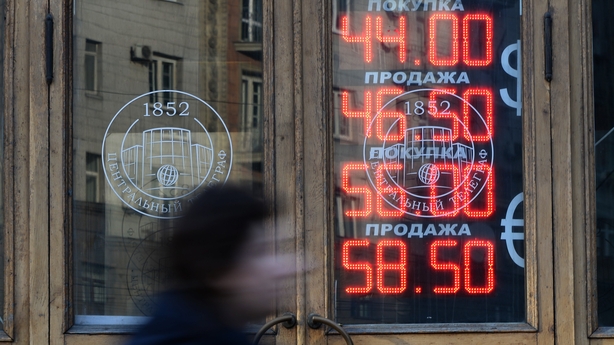The rapid slide of the rouble is a "critical situation" and the Russian central bank will take additional measures soon, the bank's first deputy chairman Sergei Shvetsov has said.
The Russian currency crashed to new record lows today, losing some 20% in value by the afternoon despite drastic overnight measures by the central bank to hike the key rate.
The rouble hit 80 to the dollar and 100 to the euro on the Moscow Exchange, before recovering to 70-per-dollar by the evening.
Overall the Russian currency has lost nearly 60% of its value since the start of the year.
"The situation is critical. We could not imagine this in our worst nightmare a year ago," Mr Shvetsov was quoted by Interfax as saying.
The central bank announced a 650-basis-point rate hike to 17% overnight, which Mr Shvetsov said "will be followed by other measures to stabilise the situation."
The RTS index of the Moscow Exchange fell by 17%, to its lowest point since 2009.
The rouble had opened around 10% stronger against the dollar after the rate hike, but reversed gains in early trade and fell to record lows, pushing losses this year against the dollar to over 50%.
The rouble has now recorded its worst fall since the Russian financial crisis in 1998 as confidence in the central bank evaporated after an ineffectual overnight rate hike.
Russian President Vladimir Putin has blamed both the slide in oil and the rouble on speculators and the West.
A weak rouble poses a major test for Mr Putin, since his popularity in part depends on his reputation for guaranteeing prosperity and stability, and it stokes inflation.

Brent crude prices fell over $1 per barrel today to below $60 for the first time since July 2009. That hurts the outlook for Russia's oil-dependent economy, which the central bank says is likely to contract early next year.
The rouble's fall also reflects declining confidence in the central bank, whose Governor Elvira Nabiullina now appears powerless to stop the currency's slide.
The market ignored televised Nabiullina comments that the rouble was undervalued today.
Analysts said that the Russian central bank may resort to capital controls as it runs out of options to revive a currency wrecked by the oil-price slump and international sanctions.
However the country's economy minister Alexei Ulyukayev said the government there was not considering such measures to limit purchases of foreign currency.
The subject "was not discussed" at an emergency meeting as a possible solution to the ongoing currency crisis, he said.
Ulyukayev said that the emergency meeting on the situation called by Prime Minister Dmitry Medvedev resulted in "a list of measures that should help stabilise the situation."
"Our actions will be directed at ensuring better balance of supply and demand on the domestic foreign exchange market," he said.
Russia's central bank has spent over $80 billion defending the rouble so far this year, including more than $8 billion since it floated the rouble in November. The country still has reserves of around $416 billion.
Oil prices and the Western sanctions imposed on Russia for its role in the Ukraine crisis have been the main force behind the rouble's demise, but analysts said the currency was caught up in sheer panic yesterday.
In 1998, the rouble collapsed within a matter of days, forcing Russia to default on its debt.
Although Russia's public finances and reserves are much healthier than in 1998, analysts say the country is on the brink of a full-blown currency crisis.

